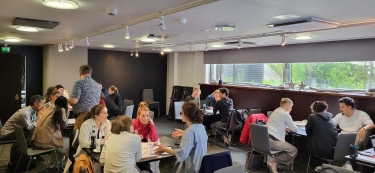EFI supports regional bioeconomy developments
The need to move away from a linear fossil-based economy towards a bio-based circular economy is widely acknowledged. As the European Commission proceeds with the revision of its bioeconomy strategy, the regional strategies and policies or the lack thereof, are also gaining increasing attention.
EFI is currently offering support to various regions as they are looking into ways of implementing the concept of bioeconomy. During his recent visit to Spain, EFI Director Dr Marc Palahí met with Ms Carmen Vela, State Secretary for Research, Development and Innovation from the Spanish Ministry for Economy, Industry and Competitiveness to discuss the role of EFI in the European research area. He also gave a speech at the National Institute for Agricultural and Food Research and Technology (INIA).
In his speech Dr Palahí pointed out that we already hold the key elements for the needed paradigmatic change in our economy – away from the linear fossil based economy towards a bio-based circular economy – as key economic actors and policy makers recognise the current problems and there is fast developing science and technology that can support the change. What is needed are solid policies, incentives and investments to implement the change, in which the role of our forests, forestry and forest-based sector is crucial. We need to increase our understanding of what the bioeconomy opportunities mean in terms of markets for new products, economic and employment implications, as well as for the sustainability of our forests, Dr Palahí said.
Dr Palahí emphasized the need for interdisciplinary knowledge at the interface of markets, policies and forest resources. He also noted that EFI is in an excellent position to offer such knowledge, and that bioeconomy is also one of the key strategic themes for EFI.
With its regional offices, EFI is able to mobilise its network efficiently and provide also regional knowledge and support. For example, EFI’s Mediterranean Regional Office EFIMED has recently organised several events on the role of bioeconomy in the Mediterranean region, where bioeconomy offers specific opportunities such as addressing the risk of forest fires by increasing forest management or the integrated management of forest and water resources. However, the region has also specific challenges related to the fragmentation of the forest sector and forest ownership which require specific policy measures and incentives.
Dr Palahí ended his speech with the recommendation for a pan-Mediterranean approach to bioeconomy by developing a transnational strategy for the region which incorporates social and environmental issues.
Further reading
Bioeconomy can tackle society’s grand challenges, statement by Esko Aho and Göran Persson
Towards a new EFI Strategy, speech by Marc Palahí at the EI 2016 Annual Conference


